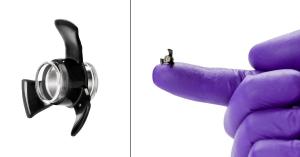New Treatment for AMD-related Vision Loss Now Available at the Royal Victoria Infirmary
Surgeon successfully implanted Samsara Vision's SING IMT™ miniature telescope into the eye of 3 patients with late-stage age-related macular degeneration (AMD)
NEWCASTLE UPON TYNE, ENGLAND, April 25, 2023/EINPresswire.com/ -- Samsara Vision, a company focused on bringing vision and freedom back to late-stage, age-related macular degeneration (AMD) patients through advanced visual prosthetic devices, today announced the availability of a new procedure for patients with late-stage age-related macular degeneration (AMD) at The Royal Victoria Infirmary, the first NHS Trust in the United Kingdom. Under the direction of Mr. Sandro Di Simplicio, Consultant Vitreoretinal Surgeon and Theatre Lead for Ophthalmology, a miniature telescope has now been successfully implanted in the first three patients. The microsurgical intervention on the eye is intended to return vision and freedom to affected patients.Currently, about 1.5 million people in the United Kingdom live with macular disease. Age-related macular degeneration (AMD) is the most common condition, generally affecting people over the age of 55. AMD is the biggest cause of sight loss in the UK, affecting more than 700,000 people. It affects a part of the eye called the macula, which is the most important part of the retina at the back of the eye. When a person develops AMD, light-sensitive cells in the central area of vision - the macula - become damaged and stop sending images to the brain, resulting in a "dark spot" in central vision. AMD can occur as a dry or wet variant. The dark spot grows until affected patients are virtually blind and have a high dependence on caregivers, friends and family. The individual's loss of autonomy is a challenging burden for all involved, especially because treatment options have been limited until now.
This year, a new medical device that improves the previously irreversible effects of late-stage AMD was introduced in the UK. Samsara Vision's SING IMT™ is a miniature implantable telescope just 10.8 mm in diameter that magnifies images and projects them onto healthy photoreceptors surrounding the macula in the back of the eye. This mechanism reduces the effects of the "blind spot" of AMD and allows people living in the final stages of this eye disease to see clearly again.
The almost invisible, tiny visual prosthesis is implanted in theatre, on a day-case basis, with a small incision similar to cataract surgery. This is why this implantation is only carried out by trained and experienced cataract surgeons, such as Mr. Di Simplicio at the the Royal Victoria Infirmary. Other countries in Europe have already implanted the miniature telescope in over 150 patients.
After recovering from surgery, patients work closely with a low-vision specialist and occupational therapists to learn how to use their regained vision. This rehabilitation process is done over several consecutive appointments, which can be conducted at the Newcastle Eye Centre.
Studies currently underway show that those treated can, for example, see the faces of family and friends again, read, watch TV, paint, knit, or work in the garden. The procedure is currently available at the Royal Victoria Infirmary in Newcastle upon Tyne.
Enrolment criteria for patients are very strict, but all suitable candidates will be offered a discussion with the clinician to check if this treatment is a viable option.
ABOUT SAMSARA VISION
Samsara Vision is a privately held specialty medical device company headquartered in the United States and engaged in the research, development, manufacture, and marketing of proprietary implantable ophthalmic devices and technologies that are intended to significantly improve vision and quality of life for individuals with untreatable retinal disorders. We believe that rejuvenating eyesight revives the spirit, allowing people to reconnect to the things in life that they love to see and do. Our approach includes working collaboratively with health care providers, researchers, payers, and advocates to ensure that people living with deteriorating vision have access to our novel technologies and support paths thereby better ensuring a future where they can see anew. Learn more at https://singimt.samsaravision.com/en/sing-imt.
ABOUT THE ROYAL VICTORIA INFIRMARY
The Royal Victoria Infirmary is in Newcastle upon Tyne and has been providing healthcare to communities in Newcastle and the Northeast of England for over 250 years.
Pedro Gonçalves
Samsara Vision
+41 77 535 09 90
email us here
Legal Disclaimer:
EIN Presswire provides this news content "as is" without warranty of any kind. We do not accept any responsibility or liability for the accuracy, content, images, videos, licenses, completeness, legality, or reliability of the information contained in this article. If you have any complaints or copyright issues related to this article, kindly contact the author above.


